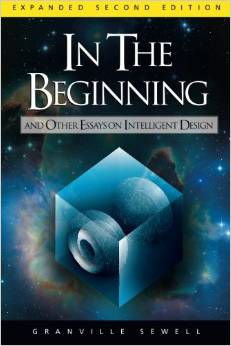 Evolution
Evolution
 Faith & Science
Faith & Science
 Intelligent Design
Intelligent Design
My Book In the Beginning and Other Essays on Intelligent Design Is Now Out in an Expanded Edition
 Editor’s note: ENV contributor Dr. Sewell is Professor of Mathematics at the University of Texas El Paso. He has written three books on numerical analysis, and is the author of a widely used finite element computer program.
Editor’s note: ENV contributor Dr. Sewell is Professor of Mathematics at the University of Texas El Paso. He has written three books on numerical analysis, and is the author of a widely used finite element computer program.
The second edition of my book In the Beginning and Other Essays on Intelligent Design was released today by Discovery Institute Press. Much of the fresh material in this new edition is designed to show that, for the origin and development of life, compelling reasons for looking beyond unintelligent causes do in fact exist.
The book was first published in 2010. However, some of the main points in the debate over evolution really have not changed so much — not merely in the past half decade, but even in the past 127 years or more.
For example, in his 1888 book Evolution, in a section entitled "Evidences of the Truth of Evolution," future American Geological Society president Joseph Le Conte focused primarily on the similarities between species, which seem to support the idea of common descent. When he gets to the fossil record, he acknowledges that
…species seem to come in suddenly, with all their specific characters perfect, remain substantially unchanged as long as they last, and then die out and are replaced by others. Certainly this looks much like immutability of specific forms, and supernaturalism of specific origin.
When he examines Darwin’s explanation for the origin of species, he acknowledges the problem of "novelties" (now called the problem of "irreducible complexity"):
… neither can it [natural selection] explain the first steps of advance toward usefulness. An organ must be already useful before natural selection can take hold of it to improve on it.
After noting that the fossil record seems to support "supernaturalism," and that Darwin’s theory on the origin of species can explain everything except anything new, Le Conte nevertheless concludes:
We are confident that evolution is absolutely certain — not evolution as a special theory — Lamarckian, Darwinian, Spencerian… but evolution as a law of derivation of forms from previous forms. In this sense it is not only certain, it is axiomatic…. The origins of new phenomena are often obscure, even inexplicable, but we never think to doubt that they have a natural cause; for so to doubt is to doubt the validity of reason, and the rational constitution of Nature.
It doesn’t matter what the fossil evidence shows, it doesn’t matter how many spectacular examples of irreducible complexity we may find, or how implausible Darwinist explanations become when applied to the astounding discoveries of modern microbiology, evolution through natural causes must be true, because, well, because it is axiomatic.
Indeed, Le Conte’s axiom that everything must have a natural cause has been so successful in other areas of science that it is certainly a reasonable and productive default position. We should not look beyond naturalistic explanations — unless, that is, we have extremely compelling reasons to believe this is necessary.
The new Section 5.1 of my book, "Why Evolution Is Different," is a little story that shows in a simple but powerful way why evolution is very different from other problems solved by science, and why it requires a very different type of explanation.
The new Chapter 4 is a June 2013 BIO-Complexity article, "Entropy and Evolution," which is a more "scientific" version of this story. The new Chapter 3, "How the Scientific Consensus is Maintained," gives a little history of my attempts to publish these ideas, and of the attempts of ID opponents to suppress them.
The new edition of my book, though, is not all about why evolution is different. It still contains the title essay "In the Beginning" about the Big Bang. It still contains a chapter on the fine-tuning of the constants of physics. And it now has even more material showing why the similarities between species, offered by Le Conte and everyone else as the most powerful evidence for natural causes, do not necessarily imply lack of design. Hint: look at the "evolution" of human technology.
The new first chapter is a very short history of the modern intelligent design movement, and defines ID by looking at what you have to believe to not believe in intelligent design.
In the Beginning and Other Essays on Intelligent Design is now available on Amazon.
